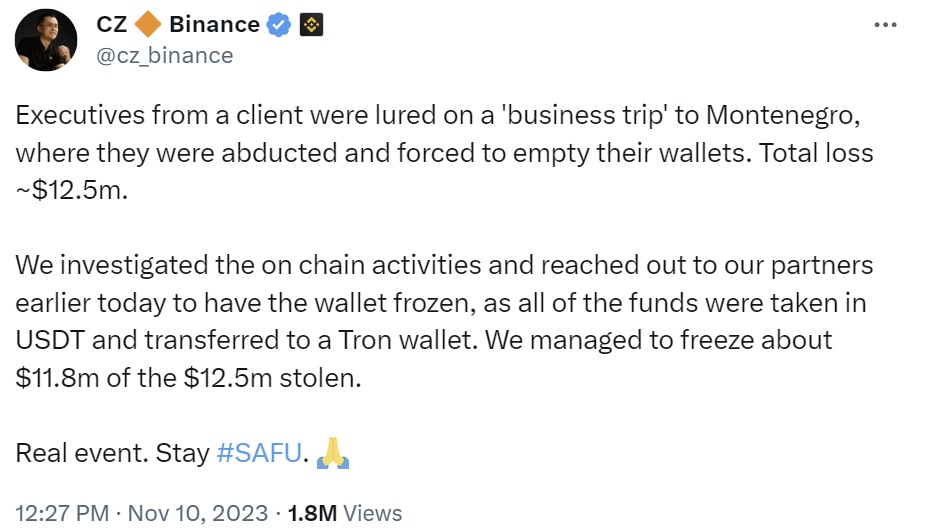
Binance CEO Changpeng Zhao (CZ) has shared a story of how executives of a Binance client were abducted and forced to empty their crypto wallets. CZ detailed how the cryptocurrency exchange was able to track the transactions and freeze over 94% of the stolen funds.
CZ Shares Story of How Binance Freezes Stolen Funds
Binance CEO Changpeng Zhao (CZ) shared a story of how the crypto exchange froze stolen funds on social media platform X Friday. Noting that the event was real, he explained that executives of a Binance client were abducted while on a business trip in Montenegro. Emphasizing that they were forced to empty their crypto wallets, CZ said the executives suffered a total loss of about $12.5 million.
Zhao detailed that Binance investigated the on-chain activities of the crypto transactions and reached out to its partners to freeze the wallet with stolen funds. He revealed that all the funds were taken in tether (USDT) and transferred to a Tron wallet. According to CZ, Binance managed to freeze about $11.8 million, or 94.4%, of the $12.5 million stolen.

When asked on X about whether crypto is better than fiat currencies kept in banks if your crypto wallet can be frozen, CZ replied: “It’s a balance, and there is no perfect balance point. If you use XMR, then there isn’t much anyone can do (or to help you with), as far as I know. Bitcoin can be traced, but not frozen, until you send it to a CEX [centralized exchange].” CZ emphasized: “The key point is, you have the choice.”
On Saturday, Binance Customer Support also highlighted on X the exchange’s standard procedure for stolen funds sent to Binance. “Depending on the information provided, Binance may grant a temporary courtesy freeze of any allegedly stolen assets … To keep the stolen assets frozen, you must provide a police report within 7 days after contacting Binance Support. Binance may extend the freeze period for you if you need more time to obtain a police report (on a case-by-case basis),” the post details.
Binance launched a Web3 wallet last week aimed at lowering the barrier for self-custody. The cryptocurrency exchange described its new Web3 wallet as “a self-custody crypto wallet built within the Binance app.” Binance additionally detailed: “A user’s private keys are broken into three smaller parts known as key-shares … Two out of the three key-shares are controlled by users, which is intentional as Web3 Wallet is self-custodial.”
What do you think about the story shared by Binance CEO Changpeng Zhao? Let us know in the comments section below.
Source: Bitcoin



